Overview
In the demanding world of healthcare, providers often face emotional challenges that can weigh heavily on their ability to deliver compassionate care. Administrative burdens can detract from the quality of patient interactions, leading to frustration and burnout. This is where voice recognition software comes into play, offering innovative solutions designed to alleviate these pressures.
The article highlights seven essential voice recognition software solutions, such as CosmaNeura and Dragon Medical One, that streamline administrative tasks and enhance patient care. By utilizing automation and real-time transcription, these tools can significantly reduce clinician burnout. Imagine a scenario where healthcare providers can focus more on their patients and less on paperwork, fostering a more compassionate healthcare environment.
Each software solution demonstrates how technology can transform the day-to-day experiences of healthcare professionals. The benefits extend beyond efficiency; they create a nurturing atmosphere where meaningful interactions thrive. As we explore these options, consider how implementing such technology could positively impact your practice and the well-being of your patients.
Take a moment to reflect on your current challenges. Could these voice recognition solutions be the key to unlocking a more compassionate approach to healthcare? Engaging with these tools may not only enhance your workflow but also enrich the patient experience, paving the way for a more empathetic healthcare system.
Introduction
In the high-stakes arena of healthcare, where every second counts and compassion is paramount, the integration of voice recognition software has emerged as a transformative force. This technology not only streamlines administrative tasks but also empowers healthcare providers to focus on what truly matters—their patients.
As the demand for efficient and effective care grows, we must consider: how can these innovative tools reshape the way clinicians interact with individuals? Ultimately, this can enhance the quality of care we provide.
Exploring essential voice recognition solutions in healthcare reveals a path toward improved patient engagement and reduced clinician burnout. Together, we can set the stage for a more compassionate future in medical practice.
CosmaNeura: Streamlining Patient Care with Voice Recognition Technology
In the demanding world of healthcare, many providers face emotional challenges that can hinder their ability to deliver compassionate care. CosmaNeura understands this struggle and utilizes cutting-edge voice recognition software in healthcare to enhance the processes of individual support. By automating administrative tasks like client intake and documentation, the platform alleviates the burden on healthcare providers, allowing them to focus more on meaningful interactions with individuals. This shift not only but also nurtures a more compassionate, patient-centered approach to care.
Imagine a healthcare environment where administrative tasks are streamlined, enabling providers to dedicate their time to what truly matters—their patients. CosmaNeura's voice recognition software in healthcare enables real-time transcription and summarization during telehealth sessions. This capability leads to precise documentation and improved communication between individuals and providers, ensuring that every interaction is meaningful and effective.
Moreover, the platform's diagnostic guidance function employs speech recognition to assess user interactions, offering clinicians differential diagnostic recommendations. This enhancement supports clinical decision-making and fosters a nurturing environment for both providers and patients. CosmaNeura's comprehensive strategy for integrating audio technology into medical services is transforming the landscape for primary service providers, particularly those committed to faith-oriented practices.
Currently, pilot testing is underway with three physicians, actively evaluating the effectiveness of these AI-driven solutions in enhancing individualized client support. Research highlights that the use of voice recognition software in healthcare can reduce documentation time by as much as 50%, significantly improving throughput and decreasing clinician burnout. This makes it an essential tool in contemporary medical practice. As indicated by PwC, approximately 40% of adults utilize voice search every day, showcasing the growing reliance on voice technology to improve healthcare efficiency.
By embracing these innovative solutions, healthcare providers can create a more supportive and effective environment for their patients. Wouldn't it be wonderful to see a future where technology empowers caregivers to focus on their most important role? CosmaNeura is here to help make that vision a reality.
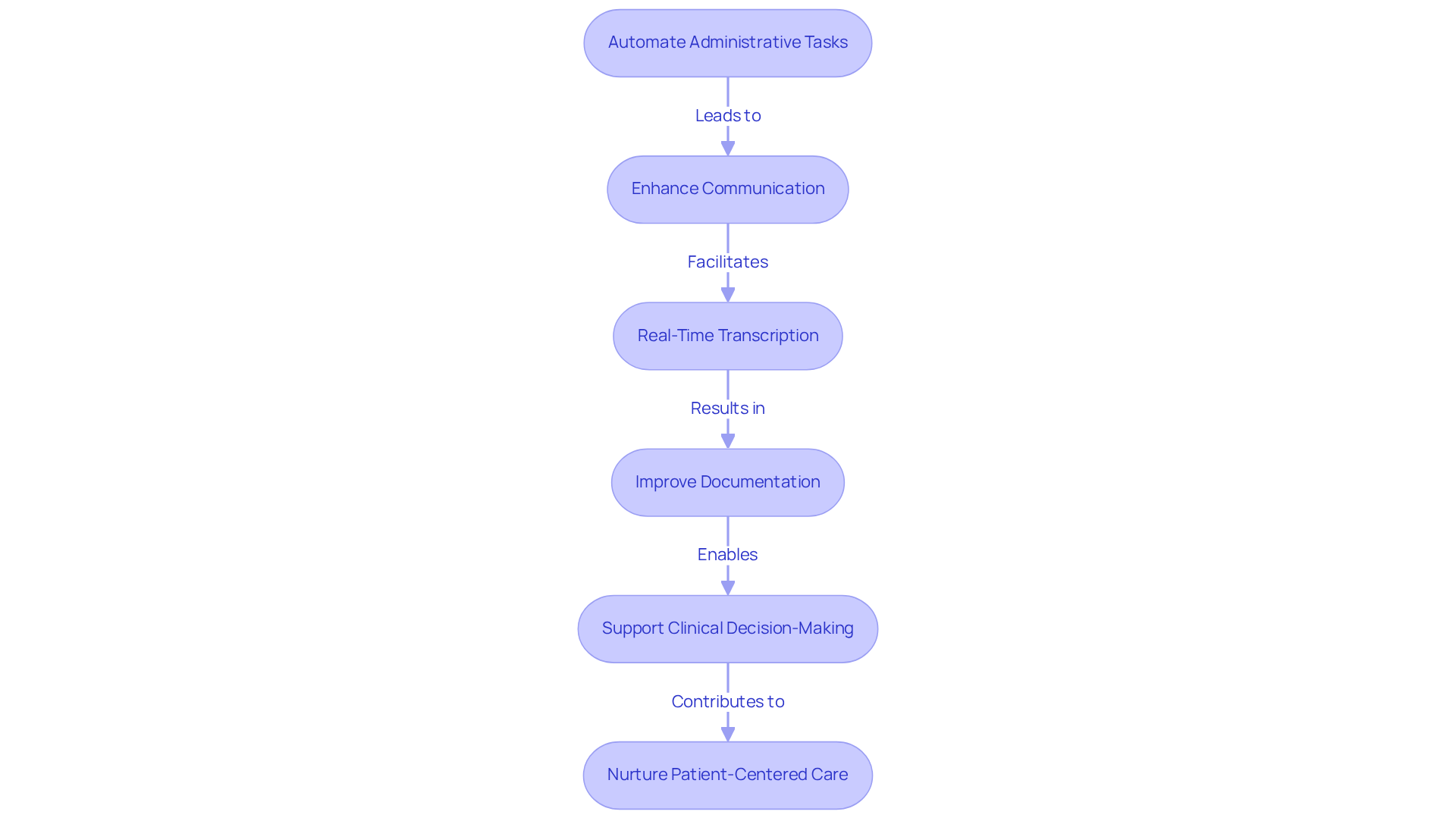
Dragon Medical One: Enhancing Clinical Documentation Efficiency
Healthcare providers today face significant emotional challenges, often overwhelmed by administrative burdens that detract from patient care. Dragon Medical One emerges as a compassionate solution, offering a cloud-based speech recognition system designed to alleviate the stress of clinical documentation. By allowing clinicians to dictate notes directly into electronic health records (EHRs), this innovative tool employs voice recognition software in healthcare to reduce the time spent on manual data entry, granting healthcare professionals several hours each day that were once consumed by routine tasks. Imagine being able to focus more on real-time client interactions, leading to improved outcomes and heightened client satisfaction.
The beauty of Dragon Medical One lies in its understanding of medical terminology, ensuring that documentation is not only faster but also accurate. Its seamless integration with various EHR systems empowers clinicians to prioritize patient treatment over administrative duties, ultimately enhancing the quality of care provided. With the ability to capture clinical documentation up to five times quicker than typing and achieving , this solution addresses the urgent issue of clinician burnout. It’s concerning to note that nearly one-third of physicians, nurses, and other frontline medical workers are contemplating leaving the profession due to the rising demands of electronic documentation.
As the voice recognition software in healthcare sector is projected to experience significant growth, solutions like Dragon Medical One are becoming increasingly vital in medical environments. They are transforming the way care is delivered, fostering a more supportive atmosphere for healthcare providers. Case studies reveal that facilities utilizing Dragon Medical One have reported notable decreases in documentation time and enhancements in clinician satisfaction. This showcases not only the effectiveness of the solution but also its potential to alleviate the challenges faced in the medical field.
In conclusion, embracing tools like Dragon Medical One can lead to a more fulfilling and efficient practice. As healthcare providers, it’s essential to consider how such innovations can support your well-being and improve patient care. Are you ready to explore how this technology can make a difference in your daily practice?
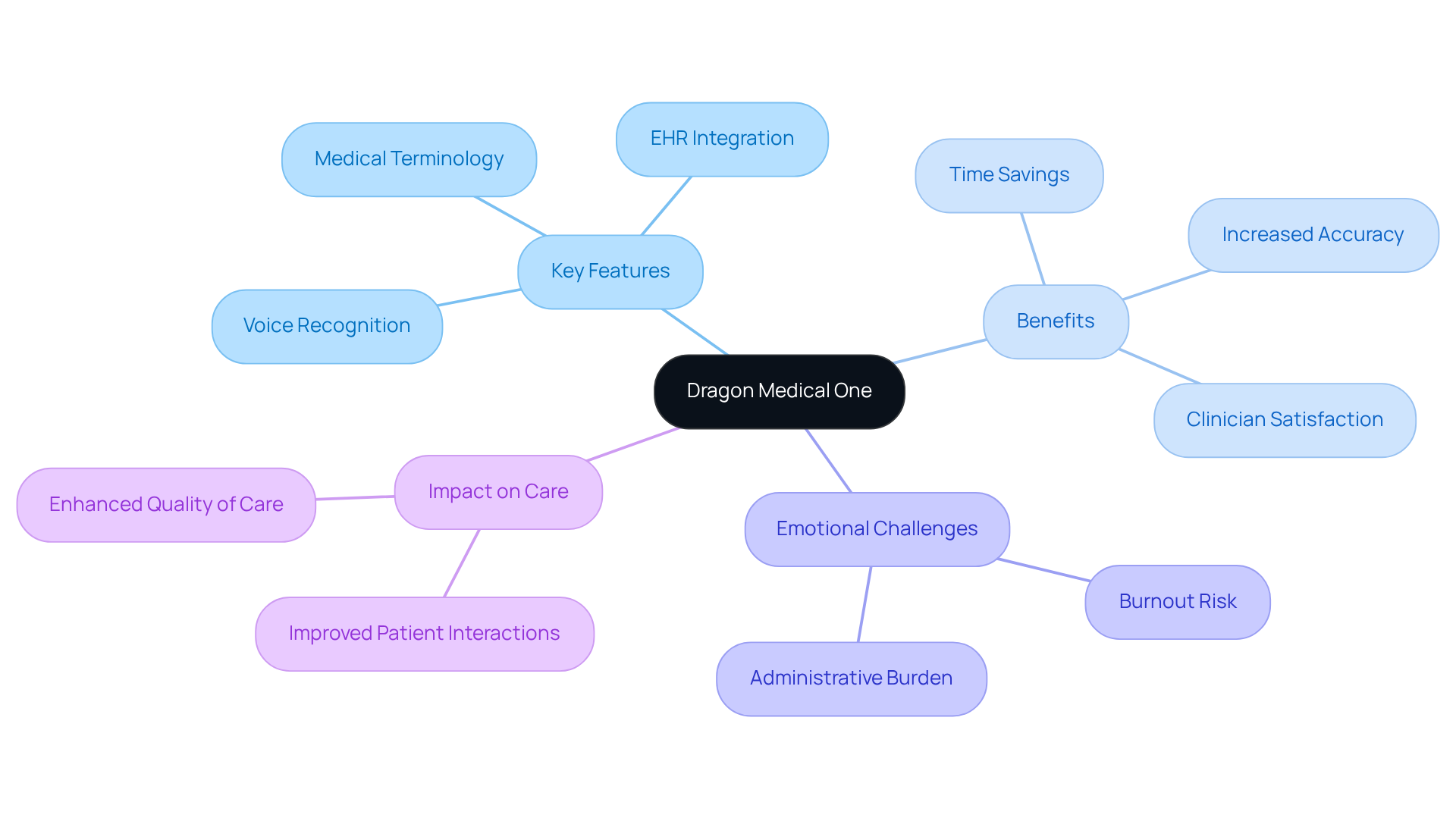
MModal: Real-Time Transcription for Improved Patient Interactions
In the demanding world of healthcare, MModal offers advanced real-time transcription services designed to truly enhance interactions with individuals. This innovation addresses the common resistance to change in the medical field by ensuring that discussions between clinicians and those receiving care are accurately recorded as they unfold. By capturing essential information swiftly, MModal allows healthcare providers to dedicate their full attention to those they serve. This approach minimizes distractions from note-taking, fostering a more engaging and compassionate atmosphere—an essential component for building trust and rapport.
Integrating MModal into clinical workflows not only boosts documentation precision but also enriches the overall experience for individuals receiving care. Clinicians can maintain eye contact and actively listen, alleviating concerns about service quality. This technology exemplifies how sound recognition can , making it more efficient and centered on individual needs. As healthcare professionals increasingly adopt speech recognition technology, the shift towards enhanced individual engagement through transcription services becomes more apparent. This evolution ultimately leads to improved health outcomes and a transformation in healthcare delivery, inviting us all to embrace these advancements for a brighter future.
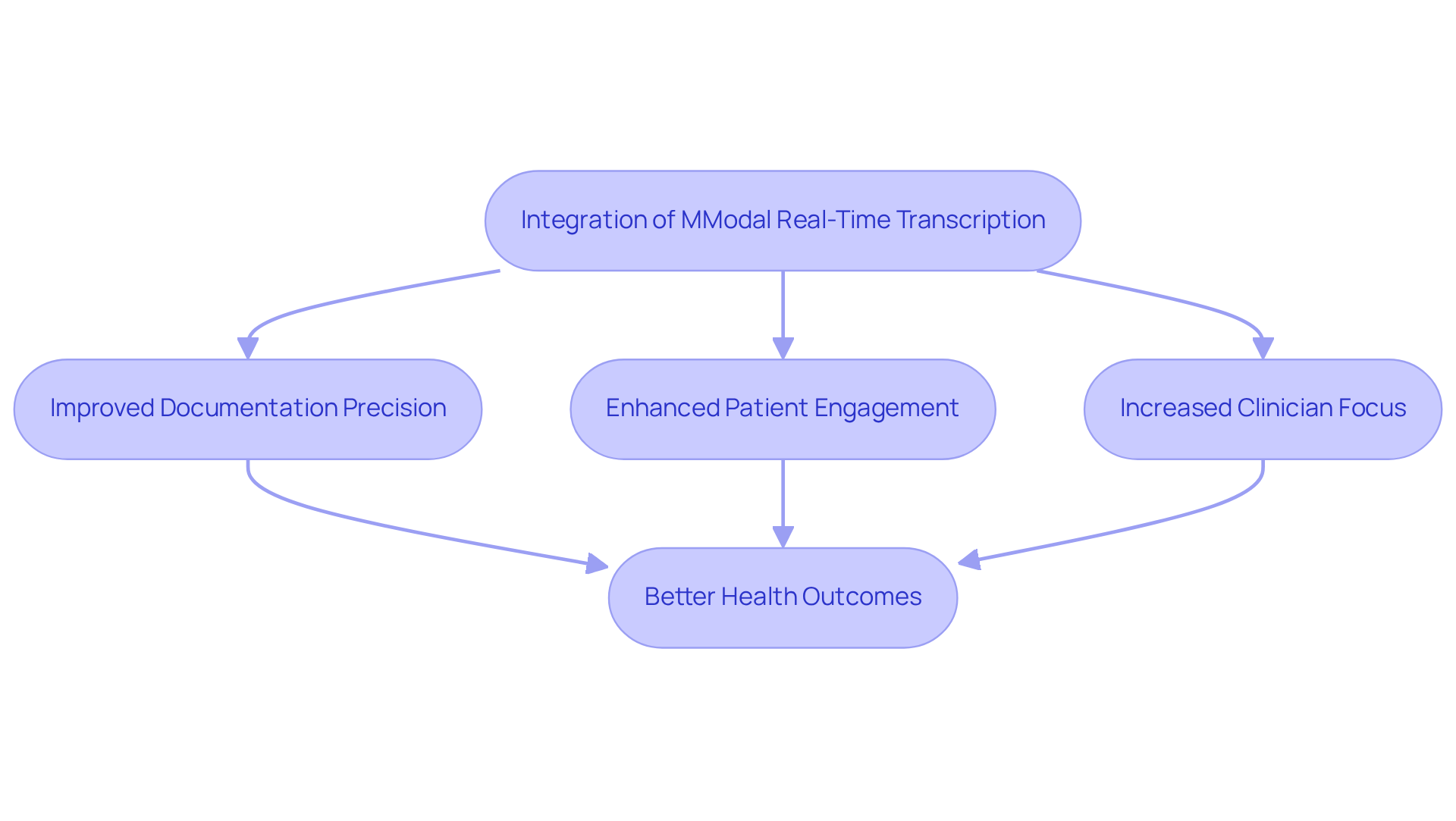
Nuance: Accelerating Patient Data Entry with Seamless Integration
In today’s healthcare landscape, providers face immense emotional challenges, often finding themselves overwhelmed by administrative tasks. Nuance offers advanced voice recognition software in healthcare that can significantly alleviate these burdens, seamlessly integrating with various EHR systems. Imagine using voice recognition software in healthcare to dictate patient information directly into records, drastically reducing the time spent on paperwork. Voice recognition software in healthcare not only but also ensures accuracy, allowing clinicians to focus on what truly matters—their patients.
The reality is that many doctors dedicate two-thirds of their time to administrative duties, which can detract from the quality of patient care. This highlights a critical need for improved data entry processes. By incorporating voice recognition software in healthcare alongside Nuance's solutions into existing workflows, healthcare providers can adopt innovative technology without the stress of extensive system overhauls. This flexibility is essential for enhancing productivity while prioritizing the well-being of both patients and providers. Plus, with Nuance® Dragon® Medical One being HIPAA compliant, security and confidentiality are assured.
By optimizing data entry procedures, Nuance empowers clinicians through the use of voice recognition software in healthcare, enabling them to devote more time to meaningful interactions with their patients. This shift is vital in addressing physician burnout, as reducing administrative burdens allows medical professionals to concentrate on delivering high-quality care. As Liz Carey noted, "The U.S. FDA has just publicly listed 211 AI-enabled medical devices that have received regulatory clearances." This underscores the growing recognition of AI technologies like Nuance in enhancing medical efficiency.
For medical practitioners considering this transformative technology, reflecting on the existing integration rates of Nuance speech recognition in EHR systems can provide valuable insights into its potential adoption and effectiveness. Embracing such solutions not only improves workflow but also nurtures a more compassionate healthcare environment.
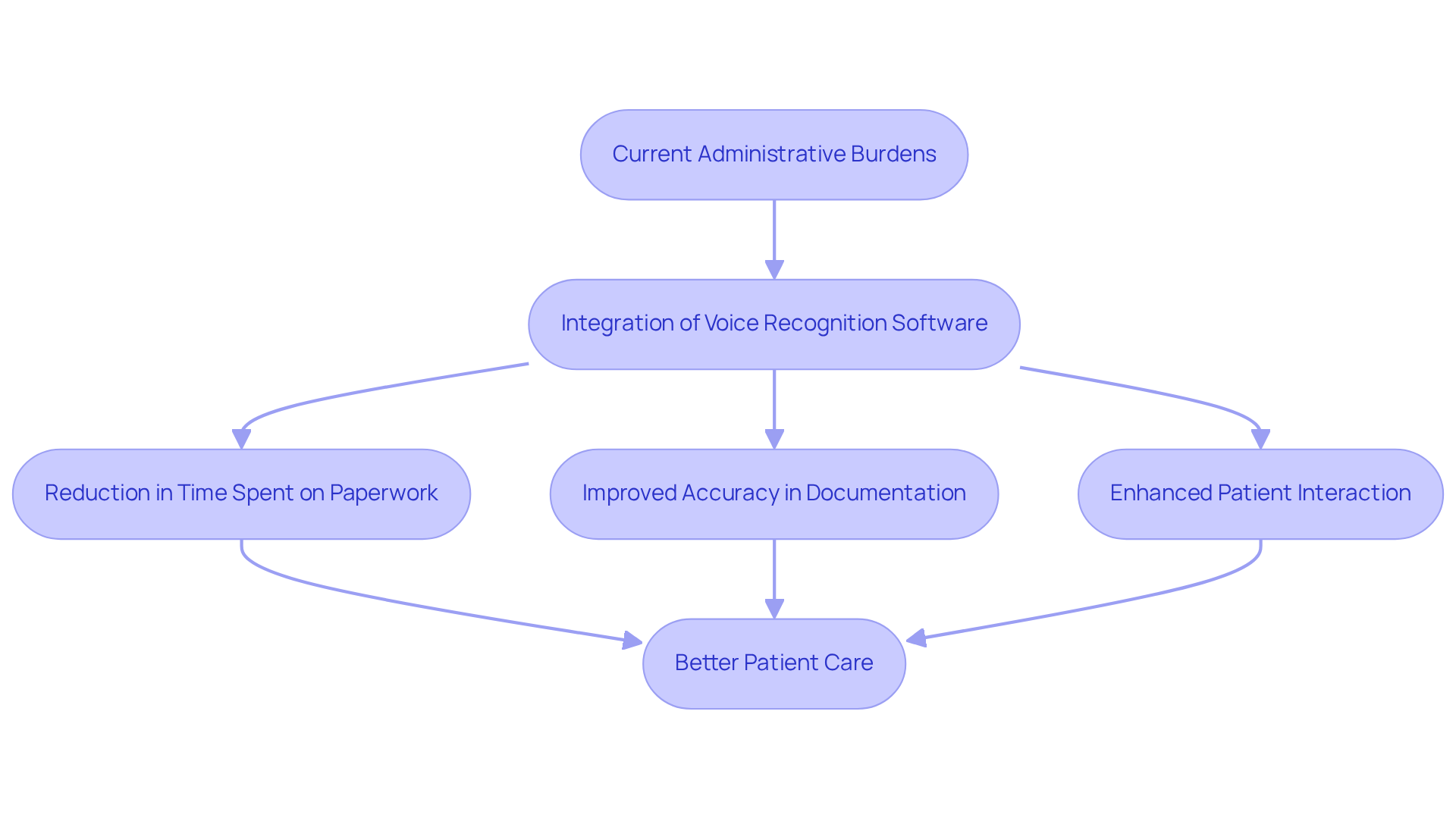
Amazon Transcribe Medical: Scalable Voice Recognition for Diverse Healthcare Needs
Amazon Transcribe Medical is an example of voice recognition software in healthcare, crafted specifically for the medical field and designed to be scalable for facilities of all sizes. Whether you're part of a small practice or a large medical organization, this service empowers clinicians to transcribe interactions with remarkable accuracy and efficiency. It directly addresses significant challenges in medical delivery, such as physician burnout and the need for improved client experiences.
As a HIPAA-eligible solution, Amazon Transcribe Medical prioritizes the security of client data during transcription. Its capacity to manage a large volume of audio files makes it suitable for various medical applications, including telehealth consultations and in-person visits. By streamlining the documentation process, this technology enhances healthcare delivery efficiency, allowing providers to focus more on patient care and reduce administrative burdens.
Have you ever felt overwhelmed by documentation tasks? The integration of speech recognition technology has proven to , with 81% of providers noting improvements after implementation. Additionally, Progress Notes volume surged by 244% from 1406.6 notes weekly to 4842.1 notes weekly after adopting this technology. This trend reflects the growing adoption of voice recognition software in healthcare, projected to evolve through 2025 and beyond.
However, many healthcare organizations still grapple with achieving full HIPAA compliance, highlighting the ongoing need for advancements in data security and usability. CosmaNeura's innovative AI solutions are designed to tackle these challenges, enhancing care delivery while aligning with Catholic values and fostering patient-centered interactions. Together, we can navigate these complexities and improve the healthcare experience for both providers and patients.
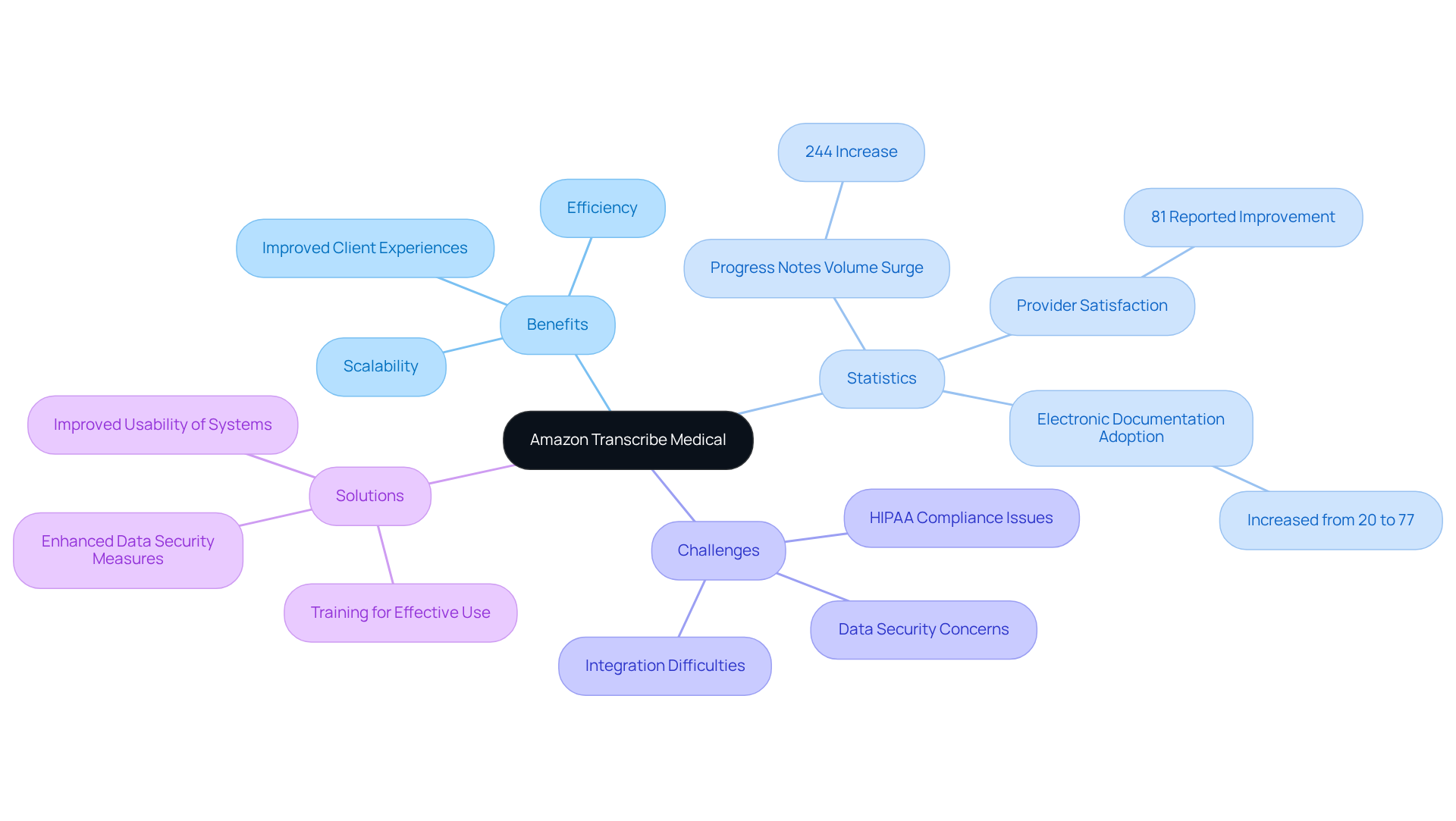
eClinicalWorks: Boosting Clinician Productivity with Integrated Voice Recognition
Healthcare providers often face overwhelming administrative burdens that can detract from their primary mission: caring for patients. eClinicalWorks understands these challenges and has seamlessly integrated voice recognition software in healthcare into its EHR platform, significantly boosting clinician productivity. Imagine being able to dictate notes and client information directly into the system. This innovative feature drastically reduces the time spent on manual data entry, allowing clinicians to focus more on their patients rather than paperwork.
This speech recognition capability is specifically designed to comprehend medical terminology, ensuring that documentation remains both accurate and efficient. How much more meaningful could consultations become if clinicians could engage more fully with their clients? By simplifying documentation procedures, eClinicalWorks not only enhances productivity but also improves the overall client experience.
eClinicalWorks stands as a prime illustration of how voice recognition software in healthcare can transform medical workflows. It enhances efficiency and focuses on individual needs, supporting healthcare providers in their vital work. By embracing such innovative solutions, we can create a more compassionate and effective healthcare environment for everyone involved.
Key Benefits of eClinicalWorks Voice Recognition:
- Increased efficiency: Reduces time spent on administrative tasks.
- Enhanced accuracy: Voice recognition software in healthcare comprehends medical terminology for precise documentation.
- Improved patient engagement: Allows clinicians to focus on care rather than paperwork.
Together, let’s explore how , ensuring that every provider has the time and resources they need to offer the best care possible.
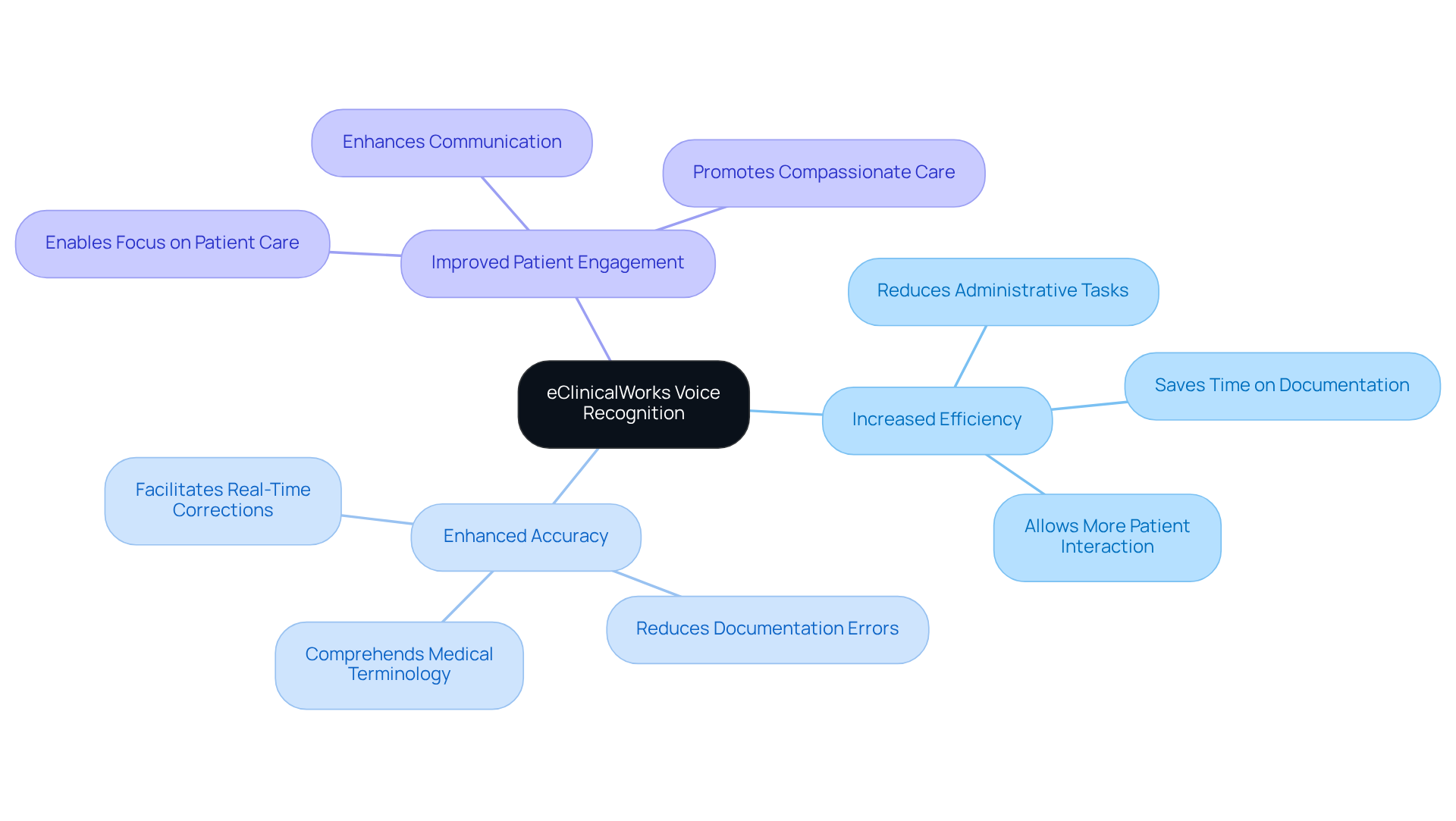
Scribe: Simplifying Documentation to Enhance Patient Interaction
Scribe is a groundbreaking tool that utilizes voice recognition software in healthcare to streamline the documentation process for healthcare providers, especially in faith-focused settings. By utilizing voice recognition software in healthcare to automate note-taking and data entry, Scribe allows clinicians to focus on their clients rather than being burdened by administrative tasks. This simplification is vital for , enabling providers to engage more fully during consultations.
With Scribe, healthcare professionals can use voice recognition software in healthcare to dictate notes in real-time, ensuring that critical information is captured accurately and promptly. This capability not only enhances documentation efficiency but also fosters a more compassionate and attentive support environment. By utilizing voice recognition software in healthcare to reduce the load of documentation, Scribe enables clinicians to focus on client engagement, ultimately enhancing the standard of care provided.
Have you ever felt overwhelmed by the administrative demands of your role? Studies show that 92% of individuals anticipate tailored reminders and messages from their healthcare providers, highlighting the necessity for effective communication. Moreover, real-time note-taking improves clinician-client interactions by allowing providers to concentrate on the specific needs of those they care for, fostering trust and acknowledgment. As Dr. Eric Topol noted, "This transformation may be one of the most significant in medical history," emphasizing the importance of incorporating technology like Scribe into healthcare. Furthermore, with 80% of individuals favoring digital communication methods for appointment reminders and follow-ups, Scribe not only improves documentation but also greatly aids in a more client-focused approach in medical services by utilizing voice recognition software in healthcare. CosmaNeura's commitment to reducing administrative burdens aligns with its mission to enhance patient care while adhering to Catholic teachings, making Scribe a vital component of this transformative effort.
However, traditional accelerators often fall short in supporting medical startups, leading to resistance to innovation within the sector. By addressing these challenges, Scribe exemplifies how innovative solutions like voice recognition software in healthcare can effectively navigate the complexities of healthcare delivery. Case studies demonstrating Scribe's impact on reducing physician burnout and enhancing interactions with individuals further illustrate its effectiveness in overcoming these barriers.
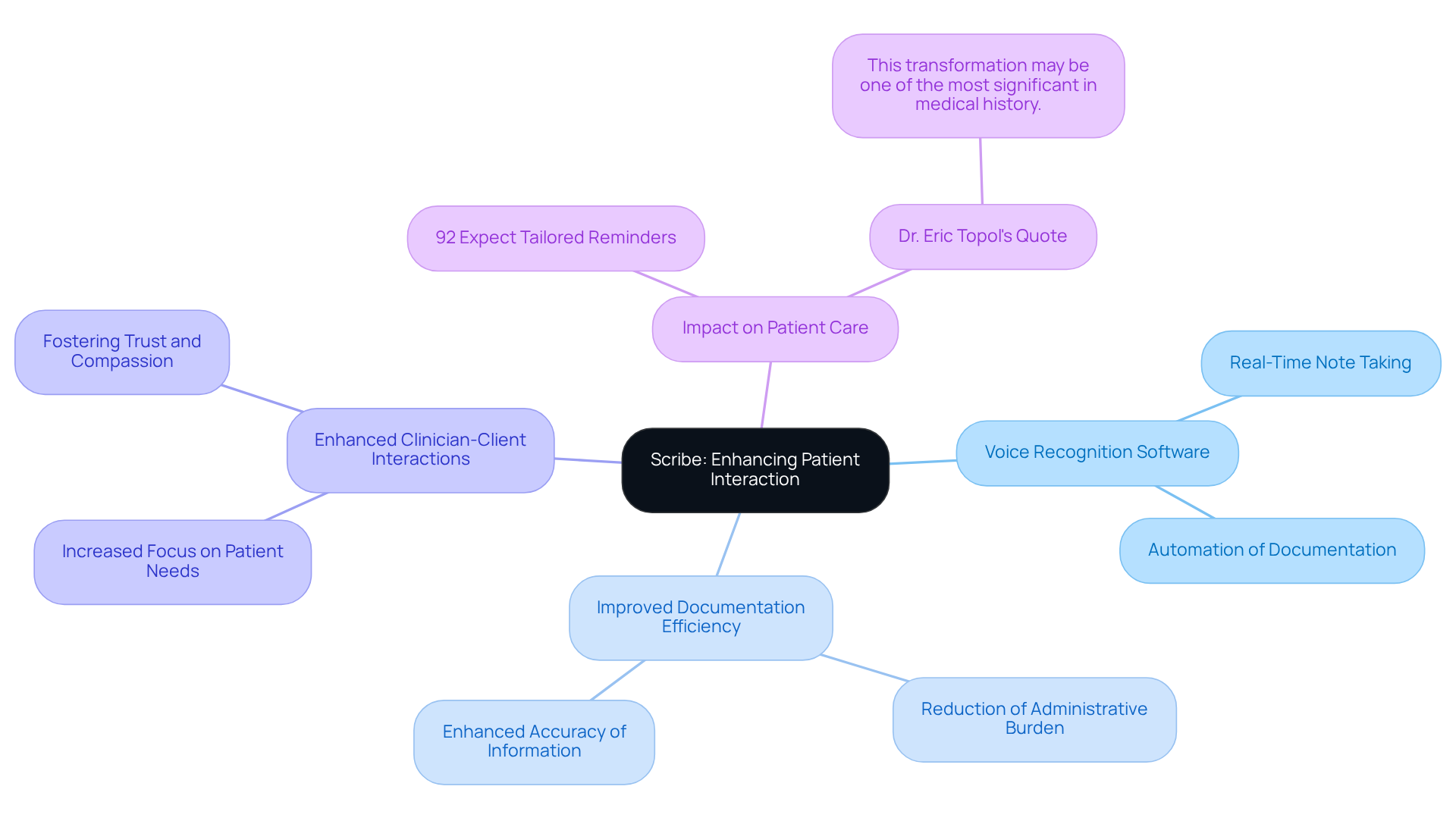
Cerner: Improving Clinical Workflows with Advanced Voice Recognition
In the demanding world of healthcare, administrative burdens can weigh heavily on providers, often detracting from the time they can spend with patients. Cerner has seamlessly integrated voice recognition software in healthcare into its EHR systems, leading to significant enhancements in clinical workflows. This innovative technology enables clinicians to dictate client information directly into the system, effectively streamlining the documentation process and significantly reducing the time spent on administrative tasks. By enhancing clinical workflows, Cerner empowers healthcare providers to devote more time to care for individuals, addressing challenges like restricted access to services and rising expenses.
Imagine the relief of having a tool that understands intricate medical terminology, ensuring that documentation remains precise and contextually relevant. Cerner's speech recognition capabilities not only enhance productivity but also enrich the overall experience for clinicians, allowing them to engage more fully with individuals during consultations. This progress illustrates how technology can revolutionize medical service provision, making it more efficient and focused on individual needs.
Research indicates that medical professionals currently dedicate about 15.5 hours each week to paperwork, a burden that speech recognition technology can significantly lighten. With the ability to by as much as 50%, Cerner's solutions allow clinicians to concentrate on what truly matters: delivering high-quality care. As the healthcare landscape continues to evolve, the role of speech recognition technology in improving clinical workflows and interactions with individuals will only expand, paving the way for a more compassionate and effective healthcare experience.
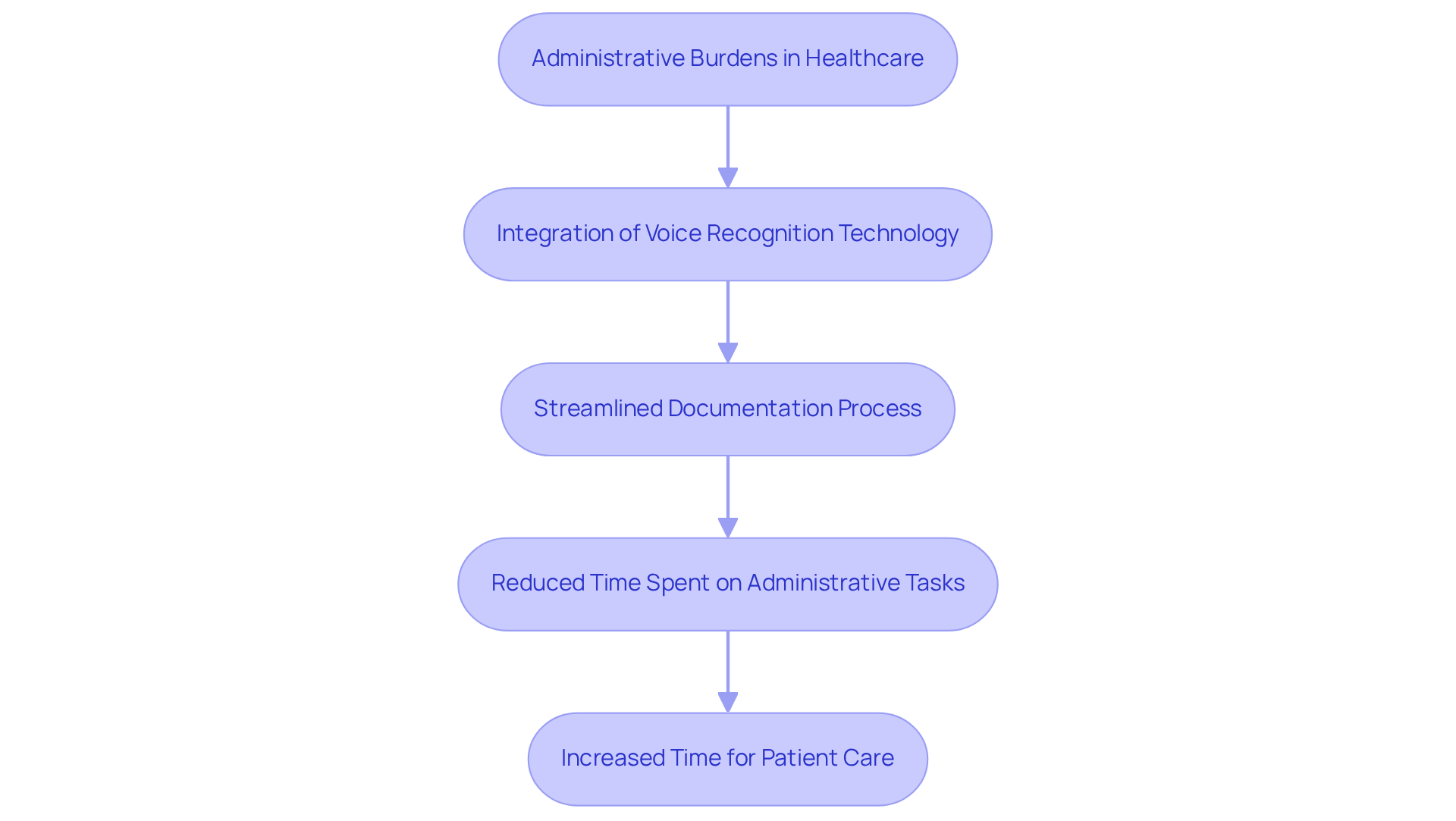
Athenahealth: Streamlining Administrative Tasks with Voice Recognition
In today's healthcare landscape, the emotional challenges faced by providers can feel overwhelming. Athenahealth harnesses voice recognition software in healthcare to ease these burdens, significantly streamlining administrative tasks within its EHR platform. By allowing clinicians to dictate notes and information directly into the system, Athenahealth reduces the time spent on manual data entry. This is crucial for improving clinician productivity and addressing the widespread issue of physician burnout. Imagine being able to allocate more time to client support—this not only enhances the quality of services provided but also nurtures the clinician-patient relationship.
The voice recognition software in healthcare is adept at understanding complex medical terminology, ensuring that documentation remains both accurate and efficient. By streamlining these administrative procedures, Athenahealth fosters a more patient-focused method of treatment. This transformation is essential in a medical environment where administrative burdens can detract from the quality of care provided. How much more fulfilling would it be for healthcare providers to engage deeply with their patients, rather than being bogged down by paperwork?
However, challenges such as accuracy issues with medical terminology can arise, necessitating ongoing training and improvements. Addressing these challenges is vital for maximizing the effectiveness of voice recognition software in healthcare technology. This integration demonstrates how Athenahealth is transforming medical workflows, making them not only more efficient but also more conducive to high-quality interactions with individuals. Ultimately, this , ensuring that care remains at the forefront of every interaction.
As we move forward, let us embrace these advancements together. By continuing to refine these technologies and supporting one another, we can create a healthcare environment that prioritizes both efficiency and compassion. Together, we can enhance the quality of care and the experience for both providers and patients alike.
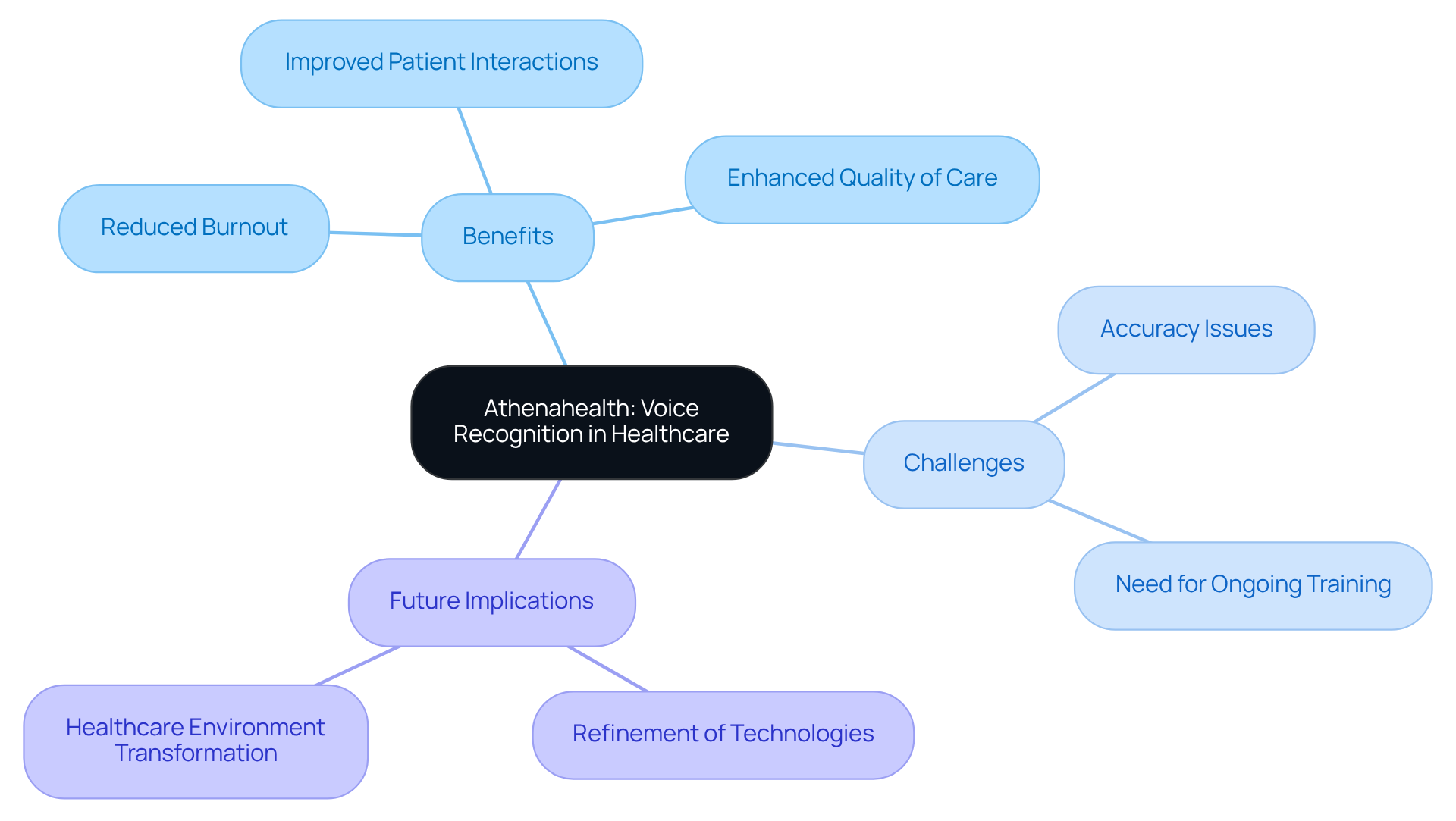
VoiceBox: Enhancing Patient Engagement through Accurate Communication
VoiceBox is an innovative tool designed to elevate through precise communication. Have you ever felt overwhelmed by the demands of patient interactions? Leveraging advanced voice recognition software in healthcare, VoiceBox enables healthcare providers to convey critical information clearly and accurately. This not only enhances the quality of interactions but also fosters a more empathetic support environment. By facilitating prompt and precise exchanges, VoiceBox empowers clinicians to build stronger connections with those they serve. Imagine the satisfaction and engagement that can result from such meaningful interactions.
This commitment to effective communication illustrates how voice recognition software in healthcare can fundamentally transform the dynamics of patient care. It makes the process more efficient and centered around the needs of patients. By reducing administrative burdens, healthcare providers can focus more on what truly matters: the well-being of their patients. Let’s embrace this opportunity to enhance our communication and deepen our connections. Together, we can create a healthcare experience that truly resonates with those we care for.
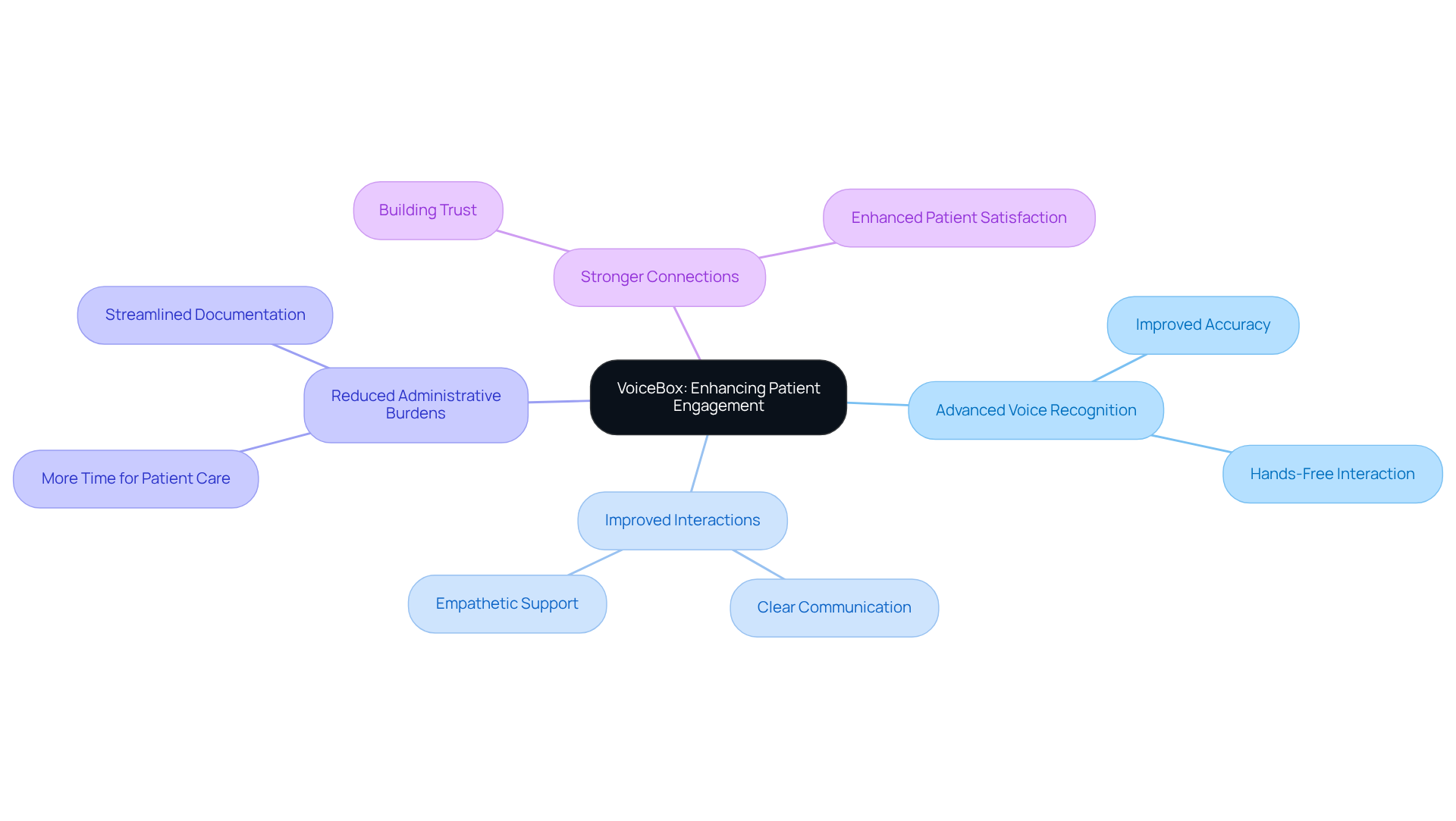
Conclusion
In the realm of healthcare, the integration of voice recognition software emerges as a transformative force, enhancing both clinician efficiency and patient care. Have you ever felt overwhelmed by administrative tasks? By automating these burdens, innovative technologies empower healthcare providers to focus on what truly matters: delivering compassionate and attentive care to their patients. Each platform discussed, from CosmaNeura to VoiceBox, showcases a commitment to alleviating documentation challenges and improving communication, ultimately fostering a more supportive healthcare environment.
Several key solutions stand out, including:
- Dragon Medical One
- MModal
- Nuance
Each offers distinct advantages, such as real-time transcription, seamless EHR integration, and improved data accuracy. These tools not only reduce the time spent on paperwork but also enhance clinician satisfaction and patient engagement. As healthcare continues to evolve, the importance of adopting these technologies becomes increasingly clear, paving the way for a more efficient and compassionate approach to medical care.
As the industry moves forward, embracing voice recognition technology is essential for addressing challenges like clinician burnout and administrative overload. By investing in these solutions, healthcare providers can significantly improve workflows and, more importantly, the quality of care they offer. The future of healthcare lies in harnessing the power of technology to create meaningful interactions, ensuring that every patient receives the attention and care they deserve. Are we ready to take this vital step together?




